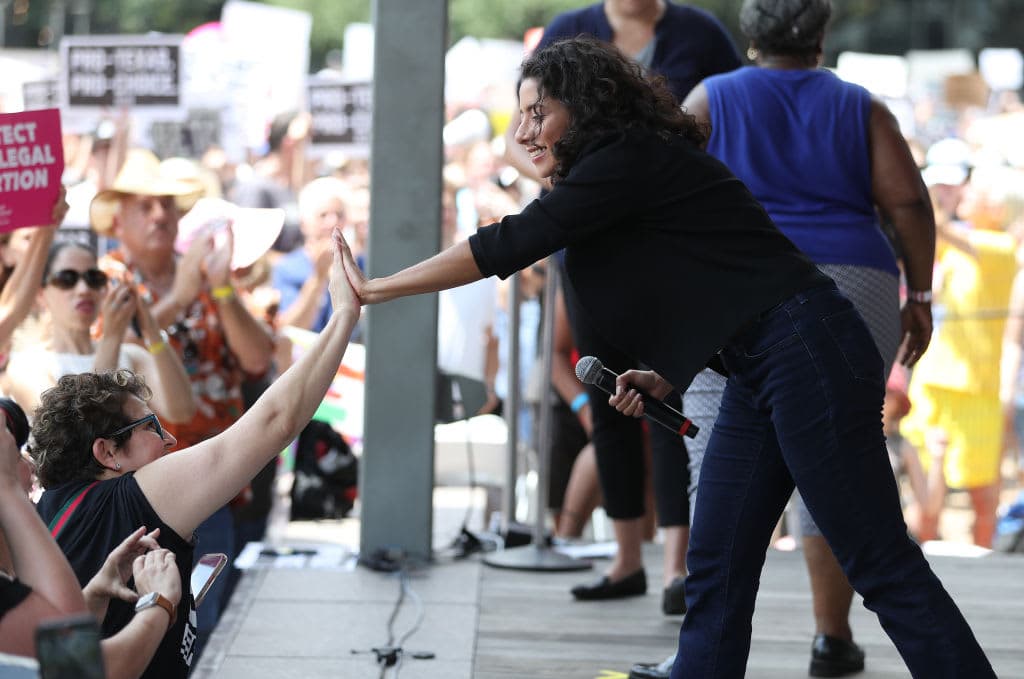Want to run for office? Here’s how
It might seem like 2023 would be a slow year for a nonprofit dedicated to helping young people in the U.S. run for office. The big election is next year, right? But political strategist Amanda Litman, an Emerson Collective Dial Fellow and the founder of Run For Something, promises that is not the case.
“Elections are happening at all points throughout the year. We have election days tomorrow, next week, a month from now,” says Litman of her work helping people under 40, who are underrepresented among elected officials, run for office. “We're running parallel programs—working with folks in 2023 races, making sure that they have what they need to run strong campaigns; and making sure we're getting folks lined up to run in 2024, as the earlier we can start working with them, the better.”
If there’s anything that Litman and her team have learned, helping more than 800 people win seats on local school boards, city councils, and state legislatures since 2017, it’s that anyone can be a formidable candidate—if they have a passion for doing good in their community. Below, their biggest lessons, gleaned from candidates’ stories.
Lesson #1: Identify the problem you want to solve and the office that lets you solve it.
Lina Hidalgo first ran for office in 2018 in Harris County, Texas, after watching the city of Houston respond to Hurricane Harvey and being deeply concerned with how flood relief was disbursed. So she decided to run for the office that dealt with emergency response: county judge. When Run for Something first met her, Hidalgo was a 27-year-old Colombian immigrant running against a long-time Republican incumbent and nearly everyone in politics saw her as a long-shot. But after running a tough campaign and winning by a slim margin, she was sworn in as Harris County's first Latina county judge in 2019.
The lesson here is that the ideal candidate doesn’t have a specific background or look. The only thing a candidate needs, says Litman, is to be able to answer the question: What is the problem you care about solving? She asks potential candidates, “What’s the thing that either makes you so mad that you can't sleep at night or so excited that you can't stop thinking about it?” If you run, the answer will become the story you tell—and the promise you’re making to voters. Which is not to say it’s the only problem you’ll address. Since Hidalgo was elected, she’s fixed the budgeting process for emergency response, increased election turnout by moving toward 24-hour voting, and held press conferences from the county commissioner's office in both Spanish and English. “She's one of the most powerful women in Texas,” says Litman. “And she ran on flood reform.”
Lesson #2: Know it’s never the right time to run.
In Texas, Erin Zwiener was a children's book author and Jeopardy! champion who, after questioning her representative in the Texas House about banning sanctuary cities—municipalities that decline to cooperate with federal immigration enforcement—decided to run for his seat herself. “She announced she was running and found out pretty quickly that she was pregnant,” says Litman. “She was feeling very sick. The easy thing to do would've been to drop out and wait. But Erin didn't.” Instead, Zwiener recognized it was something she could address up front in her campaign. “I could let the pregnancy be a liability or I could try to turn it into a strength,” Zwiener said in an interview. “I want my daughter to have a great life and I want all other Texas kids to have a great life, and there’s a lot we need to do to make that happen.” She ran with that message—and won.
While it’s important to be physically healthy, to make sure your family and friends support you, and to have a measure of financial stability, Litman assures that it’s never going to feel like the perfect moment. So if you have an inkling that you could do a good job, her advice is: dive in and try. “If you can answer what the problem is you care about, how the office you're running for is giving you a place to solve it, and why should voters want you to win—everything else is just logistics.”
Lesson #3: Knock on doors for votes — and to fall in love with your community.
When Chloe Maxmin ran for Maine’s House of Representatives in 2018, she was a 26-year-old climate activist seeking election in one of the oldest, most rural districts in the country. After knocking on doors and talking to blue voters for the primary and feeling in her comfort zone, “I started to talk with Republicans and independents as we were heading toward the general,” she said in an interview. “Talking to those folks in my community totally changed my identity as a progressive organizer,” she said. “I had all these preconceptions about Republicans, and all of that was completely broken down. Because when I took the time to listen to people, and really respect where they were coming from, I did find that I have way more in common with them than I thought.”
Knocking on doors, says Litman, is the most important thing candidates can do. Not only has research shown that a door knock is the most meaningful outreach method, but it’s only in listening to the people in your community that you discover the hardships they’re facing and what matters in their lives. It’s an insight that led Maxmin to win that election and get elected on to the Maine State Senate in 2020, garnering bipartisan support for green legislation that prioritizes workers.
Lesson #4: Recognize that losing isn’t the end of the line.
Jennifer Carroll Foy was a public defender in Virginia and one of the first African-American women to graduate from Virginia Military Institute. In 2017, she ran for the Virginia House of Delegates and won the seat for Second District, using her role to expand Medicaid, raise the minimum wage, and help veterans open small businesses. In 2020, she resigned with an even bigger goal in mind: governor. But she placed second in the primary. “She came up short,” says Litman.
Litman points out that sometimes the final tallies are about a candidate’s ideas — and sometimes they’re about fear of what they represent, especially for candidates who are BIPOC, female, or LGBTQ+. But either way, each election is a chance to meet voters and show them who you are. Invariably, people tell Run for Something that they learn more from their losing campaigns than they do their winning ones. “To a tee, every person we've worked with has said it was worth it and that they would do it again," Litman says. And that is exactly what Foy is doing. In fact, she just won her primary for Virginia State Senate. "A loss is just part of the process," Litman says.
Lesson #5: Running isn’t the only way to contribute to your community.
Running for office is a life-changing experience, says Litman, and having more young people do it will be essential—for governments to accurately reflect the populace, take into account the needs of those who are just starting out, and drive toward policies that respect the urgency of climate change. But perhaps you consider the idea of running, and decide it just isn’t for you. “Even thinking about the act of running forces self-reflection that is really good for people,” says Litman. “If I'm not ready to run for that position, how else am I going to push for that thing I care about? Where’s my entry point?"
Run for Something’s staff has more than doubled over the last twelve months and Litman expects them to endorse 650 candidates this year alone. But if you won’t be among them, there’s still so much you can do. Volunteering on campaigns, joining local advocacy groups, even just showing up at school board or city council meetings are all meaningful actions. “They say the squeaky wheel gets the grease,” says Litman, “and you can be a very squeaky wheel in your local town or city.”

